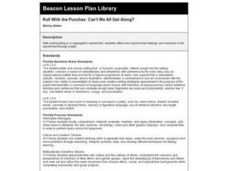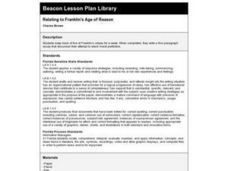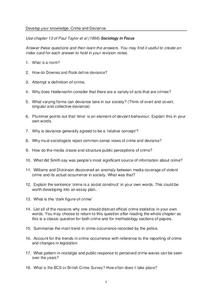Curated OER
First Grade, First Grade, What Do You See? (Elementary, Reading/Writing)
First graders assist in making a list of the many things that Brown Bear saw in the story. They create an illustration of the person, place, or thing that they wrote about in their pattern sentence.
Curated OER
Help Me Learn About the Holocaust
Young readers select a book from a provided list to use as the basis for an intensive class study of Holocaust novels. After completing their novels, groups create a multimedia presentation highlighting the elements of literature...
Curated OER
The Problem with Prejudice
Third graders read and discuss "The Hangman" by Maurice Ogden and answer questions about the poem. They list things they can do to combat prejudice using each of the letters in the word and create a small poster with a slogan against...
Curated OER
ROLL WITH THE PUNCHES: CAN'T WE ALL GET ALONG?
Learners reflect and explore their feelings and reactions to a segregation experiment through poetry. They discuss acceptable behavior during the experiment and the next day write journal entries reflecting their experiences.
Curated OER
I Am a Book
Third graders discuss books that have been banned and the things that they have in common. They explore the concept of freedom of speech and write poems based on their discussion.
Curated OER
WORDS FRANKLY SPOKEN
Students visit appropriate websites to discover quotes from Franklin's Poor Richard's Almanac. Working in pairs, they choose three quotes on which to elaborate and then write two original quotes.
Curated OER
Relating to Franklin's Age of Reason
Fourth graders read a selection describing 13 virtues from "The Autobiography of Benjamin Franklin." They keep track of their behavior and whether or not they can keep up with 5 chosen virtues. They write a 5 paragraph essay on their...
Curated OER
Sidewalks to Success in Middle School
Students write a brochure that educates incoming middle school students on how to succeed.
Curated OER
White Collar Crime
Students discuss difference between crimes of deceit versus crimes of violence, define white-collar crime, and examine far reach of white collar crime laws. Students then analyze what differences exist between rationales for punishing...
Curated OER
Biographical Research Paper
Students choose a subject for a biographical research paper. They use books, the Internet, encyclopedias and articles to gather information on a determined subject then follow a rubric to write a research paper.
Curated OER
Growing Pains of the Yearling
Fourth graders read The Yearling by Marjorie Kinnan Rawlings.
Curated OER
The Only Superstitious Person Is Huck Finn
Fourth graders interview people from three different age groups about superstition including what they believe and why they believe it. This lesson goes along with the classic book, The Adventures of Huckleberry Finn.
Curated OER
Perspectives on Written & Spoken English
Students explore issues surrounding language norms, including the distinction between prescriptive and descriptive norms, the differences between norms for spoken English and those for written English, how word meanings change, and...
Curated OER
Famous People Research Project
Fourth graders research a famous person in Michigan history. They will use at least three different resources including technology to conduct their research. They then will use various forms of technology to create individual research...
Curated OER
Crime and Deviance
In this Crime and Deviance worksheet, students answer seventy-eight questions, then respond to ten essay questions on these topics.
















